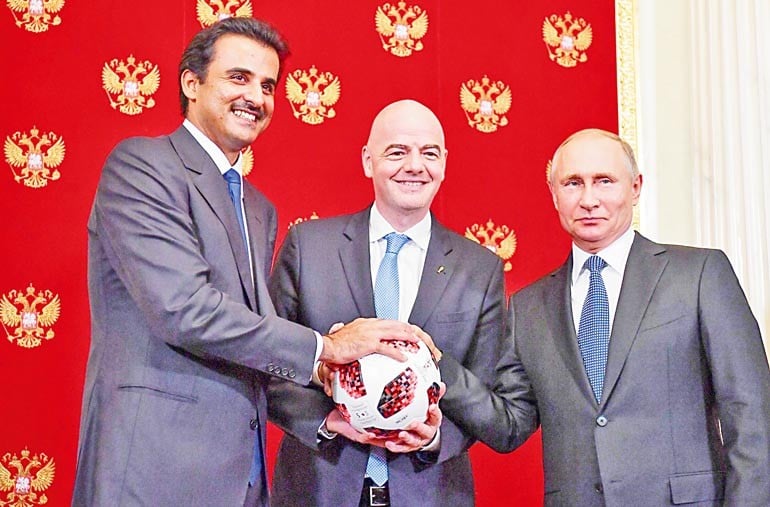
The oil-rich nation is preparing well to host the next edition of the world’s most keenly followed sports event

The successful culmination of 2018 Football World Cup in Russia by Vladimir Putin and his team has raised the bar for sports loving Qatari Ameer Sheikh Tamim Bin Hamad Al-Thani.
The present Russia with its mammoth 144.3 million population is spread over 17.09 million sq km. Covering one eighth of Earth’s inhabited land area, Russia has a very rich history and culture dating back to 862 AD, as compared to Qatar which has 2.57 million population and area of 11437 sq km only.
Sheikh Tamim bin Hamad, like Vladimir Putin, is an ardent sportsman. Educated in Great Britain and a graduate of Royal Military Academy Sand Hurst (1984), the Sheikh of Qatar has the knowledge, vision and resolve to showcase Qatar as a rising power of Islamic World in the peninsula.
In 2005 the Amir of Qatar founded Oryx Qatar Sports Investments. In 2006 he chaired the organising committee of 15th Asian Games in Doha and successfully hosted the Asian Games as dress rehearsal of 2022 Football World Cup.
Under his visionary leadership and guidance, Qatar won the rights to host 2014 FINA World Swimming Championship. There were many allegations of bribery to Executive Committee members of FIFA and ultimately their suspension by FIFA, but Qatar denied the allegations and said that such statements were a result of mistrust and envy of those who did not want Qatar to hold such prestigious sports events.
Qatar is doing its best to hold the first-ever football World Cup in an Islamic country which has zero tolerance policy towards corruption and bribery. In order to hold the World Cup successfully in the desert terrain, the first five stadiums were unveiled in March 2010.
Besides Doha, the World Cup matches will be held in Lusail, Al-Rayyan, Al-Khor, Umm Salal, Al-Wakrah and Ash-Shamal.
The greatest challenge for Qatari management was to address the extreme temperatures in June and July when mercury can touch 50 °C in Qatar. The Qatari Football World Cup management has harnessed the power of solar energy to provide uninterrupted power and cooling for players and spectators in the stadiums.
These state-of-the-art cooling techniques will be able to reduce temperatures from 45°C to 25°C, thus making every one comfortable.
The Qataris have been very thoughtful while designing these mega structures and have kept their future utility in mind. The stadiums designed by Germany’s Albert Speer and Partners have been built in two parts, with an upper and a lower tier.
After the 2022 World Cup, the oil-rich Qataris intend dismantling the upper tiers of these stadiums and donate them to countries which have less developed sports infrastructure.
Besides stadiums, Qatar is fast developing its airports, hotels, metros and other support structure necessary to accommodate and transport millions of visitors.
The Qataris will have to muster a large force of young volunteers and educate its young generation in schools and colleges about value of sports and to be true representatives of Qatari culture and hospitality, yet be more flexible and open towards other cultures, which will start flowing into Qatar well before the start of World Cup.
It will be a great opportunity for the Muslim World to unleash its concept of "Muslim Muscularity" by fielding well prepared teams to face the strong and skillful European and South American footballers. This will also be a wonderful opportunity for Qataris to demonstrate their management and leadership skills and convert Doha into a centre of sports research and development for the rest of Islamic world.
Pakistan has a great opportunity to learn from this mega sports event. Our leadership must think beyond sending labour and security personnel to Qatar. It is a golden opportunity for Pakistan to forge some meaningful agreements with Qatar and get major portions of dismantled sports infrastructure from brotherly Qatar after the World Cup.
The authorities should also look into the possibility of attaching fresh Pakistani graduates from the area of sports sciences and sports development with Qatar World Cup football management, for gaining experience in sports and event management of such magnitudes.